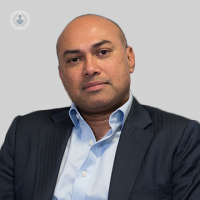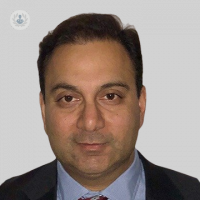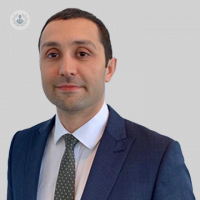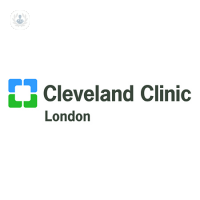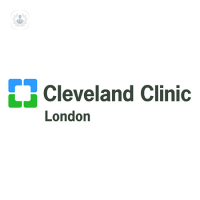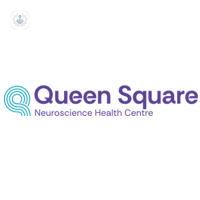What is oesophageal cancer?
Oesophageal cancer is a type of cancer that affects the oesophagus (gullet or food pipe), which is the long tube that carries food from the throat to the stomach. It occurs when abnormal cells grow in an uncontrollable way. It is more common in people in their 60s and 70s and occurs in men more than women.
What are the symptoms of oesophageal cancer?
The symptoms of oesophageal cancer include:
- Difficulty in swallowing (dysphagia) – this feels like a pain or burning sensation in the throat or chest.
- Indigestion – occurs when acid from the stomach goes back into the oesophagus.
- Heartburn – which is a burning chest pain after eating.
- Weight loss – follows as a result of not being able to eat food because of the pain.
- Pain in the throat - and behind the breastbone
- A persistent cough
- Dark poo – faeces may be almost black if the oesophagus bleeds from cancer.
What are the causes of oesophageal cancer?
The exact cause is unknown but persistent gastro-oesophageal reflux disease (GORD), smoking, excessive alcohol, being overweight and having an unhealthy diet are risk factors for the disease.
How is oesophageal cancer diagnosed?
The cancer is diagnosed using an endoscopy, which allows the doctor to see inside the oesophagus. The small, thin tube with a camera and light on the end is passed into the mouth and down towards the stomach. Sample tissues are removed so that they can be checked under a microscope. The other test used is a barium swallow, where the white liquid is swallowed and X-rays are taken. The barium highlights the lining of the oesophagus so it can show whether there is anything blocking the oesophagus.
What are the treatments for oesophageal cancer?
The treatment plan for oesophageal cancer depends on where in the oesophagus the cancer is and how big it is. It depends on whether the cancer has spread anywhere else in the body and on the patient’s general health.
If it is diagnosed during an early stage, it may be possible to cure it with the surgical removal of the affected area of the oesophagus. Chemotherapy kills the cancerous cells and shrinks the tumour.
If the cancer is diagnosed at a later stage, the cure is not achievable but surgery, chemotherapy and radiotherapy can be used to keep cancer under control and relieve symptoms.
What’s the outlook for oesophageal cancer?
The outlook depends on the stage of oesophageal cancer. It depends on how far the disease has spread, the age and the general health of the patient.
Cáncer del esófago
What is oesophageal cancer?
Oesophageal cancer is a type of cancer that affects the oesophagus (gullet or food pipe), which is the long tube that carries food from the throat to the stomach. It occurs when abnormal cells grow in an uncontrollable way. It is more common in people in their 60s and 70s and occurs in men more than women.
What are the symptoms of oesophageal cancer?
The symptoms of oesophageal cancer include:
- Difficulty in swallowing (dysphagia) – this feels like a pain or burning sensation in the throat or chest.
- Indigestion – occurs when acid from the stomach goes back into the oesophagus.
- Heartburn – which is a burning chest pain after eating.
- Weight loss – follows as a result of not being able to eat food because of the pain.
- Pain in the throat - and behind the breastbone
- A persistent cough
- Dark poo – faeces may be almost black if the oesophagus bleeds from cancer.
What are the causes of oesophageal cancer?
The exact cause is unknown but persistent gastro-oesophageal reflux disease (GORD), smoking, excessive alcohol, being overweight and having an unhealthy diet are risk factors for the disease.
How is oesophageal cancer diagnosed?
The cancer is diagnosed using an endoscopy, which allows the doctor to see inside the oesophagus. The small, thin tube with a camera and light on the end is passed into the mouth and down towards the stomach. Sample tissues are removed so that they can be checked under a microscope. The other test used is a barium swallow, where the white liquid is swallowed and X-rays are taken. The barium highlights the lining of the oesophagus so it can show whether there is anything blocking the oesophagus.
What are the treatments for oesophageal cancer?
The treatment plan for oesophageal cancer depends on where in the oesophagus the cancer is and how big it is. It depends on whether the cancer has spread anywhere else in the body and on the patient’s general health.
If it is diagnosed during an early stage, it may be possible to cure it with the surgical removal of the affected area of the oesophagus. Chemotherapy kills the cancerous cells and shrinks the tumour.
If the cancer is diagnosed at a later stage, the cure is not achievable but surgery, chemotherapy and radiotherapy can be used to keep cancer under control and relieve symptoms.
What’s the outlook for oesophageal cancer?
The outlook depends on the stage of oesophageal cancer. It depends on how far the disease has spread, the age and the general health of the patient.


All about oesophageal cancer
Por Dr Aathavan Loganayagam
2024-12-30
Oesophageal cancer is a rare type of cancer that grows in your oesophagus (the 'food pipe', or tube) that leads from the throat to the stomach. The earlier oesophageal cancer is diagnosed and treated, the better the outcome. So, how is this difficult and challenging type of cancer dealt with? Dr Aathavan Loganayagam, a leading gastroenterologist, presents a concise guide about oesophageal cancer. Ver más
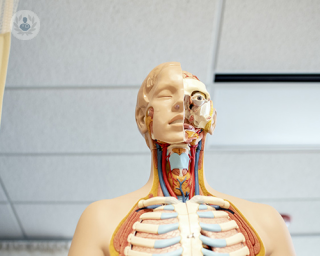

Oesophageal cancer: early signs and survival rate
Por Mr Krishna Moorthy
2024-12-29
Persistent acid reflux is a risk factor in developing oesophageal cancer. We've asked one of our top surgeons Mr Krishna Moorthy to explain the early signs of the disease, the survival rate and whether it is curable. Ver más


Oesophageal cancer: Your questions answered
Por Dr Sameer Zar
2024-12-28
In the UK, more than 9,200 people are diagnosed with oesophageal cancer each year, which is a cancer that causes extreme difficulty when it comes to swallowing food and even liquids. Here, renowned consultant gastroenterologist Dr Sameer Zar provides an expert insight into oesophageal cancer, including what changes the cancer causes in the body, and how the cancer is diagnosed and treated. Ver más


Understanding GI tract cancers: Diagnosis to treatment
Por Dr Cheng Boon
2024-12-27
The intricate network of the gastrointestinal (GI) tract, responsible for digestion and nutrient absorption, is susceptible to a spectrum of cancers. These malignancies can arise anywhere along the GI tract, from the oesophagus to the rectum, presenting diverse challenges in diagnosis and management. Understanding the nuances of GI tract cancers, including their types, symptoms, risk factors, and treatment modalities, is paramount for effective intervention and improved outcomes. Ver más
Doctores expertos en Cáncer del esófago
-
Professor Muntzer Mughal
Cirugía generalExperto en:
- Cáncer del esófago
- Cirugía del cáncer gástrico
- Cirugía de la vesícula biliar
- Disfagia
- Fístula traqueoesofágica
- Cirugía de hernia de hiato
-
Mr Krishna Moorthy
Cirugía generalExperto en:
- Reflujo gastroesofágico
- Bariatric surgery
- Cáncer del esófago
- Cirugía del cáncer gástrico
- Hernia
- Laparoscopy
-
Mr Ashish Rohatgi
Cirugía generalExperto en:
- Cáncer del esófago
- Cirugía del cáncer gástrico
- Cálculos biliares
- Reflujo gastroesofágico
- Hernia de hiato
- Hernia
-
Mr P S Jambulingam
Cirugía generalExperto en:
- Pérdida de peso
- Cirugía de hernia de hiato
- Cálculos biliares
- Hernia inguinal
- Cirugía del cáncer gástrico
- Cáncer del esófago
-
Mr Nima Abbassi-Ghadi
Cirugía generalExperto en:
- Reflujo gastroesofágico
- Cáncer del esófago
- Cálculos biliares
- Hernia
- Endoscopia
- Laparoscopy
- Ver todos

Cleveland Clinic Moorgate Outpatient Centre
Cleveland Clinic Moorgate Outpatient Centre
55 Moorgate, EC2R 6BH
No existe teléfono en el centro.
Si haces uso de este teléfono facilitado por TOP DOCTORS nos autorizas al tratamiento de tu teléfono para fines estadísticos y comerciales. Para más información, lee nuestra Política de Privacidad
Top Doctors

Cleveland Clinic Portland Place Outpatient Centre
Cleveland Clinic Portland Place Outpatient Centre
24 Portland Place, W1B 1LU
No existe teléfono en el centro.
Si haces uso de este teléfono facilitado por TOP DOCTORS nos autorizas al tratamiento de tu teléfono para fines estadísticos y comerciales. Para más información, lee nuestra Política de Privacidad
Top Doctors

Amethyst: The Queen Square Neuroscience Health Centre
Amethyst: The Queen Square Neuroscience Health Centre
42-43 Queen Square London WC1N 3AQ
No existe teléfono en el centro.
Si haces uso de este teléfono facilitado por TOP DOCTORS nos autorizas al tratamiento de tu teléfono para fines estadísticos y comerciales. Para más información, lee nuestra Política de Privacidad
Top Doctors
-
Cleveland Clinic Moorgate Outpatient Centre
55 Moorgate, EC2R 6BH, Central LondonExperto en:
- Aparato Digestivo
- Cardiología
- Dermatología
- Diagnóstico por imagen
- Diagnósticos
- Ginecología y Obstetricia
-
Cleveland Clinic Portland Place Outpatient Centre
24 Portland Place, W1B 1LU, Central LondonExperto en:
- Diagnóstico del cáncer
- Diagnósticos
- La salud de la mujer
- Medicina del Deporte
- Medicina familiar
- Revisión de salud
-
Amethyst: The Queen Square Neuroscience Health Centre
42-43 Queen Square London WC1N 3AQ, Central LondonExperto en:
- Angiología y Cirugía vascular
- Dolor oncológico
- Neurocirugía
- Neurología
- Oncología Médica
- Tratamiento del cáncer
- Ver todos

